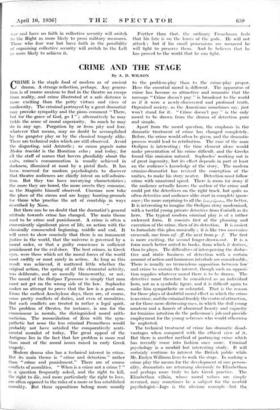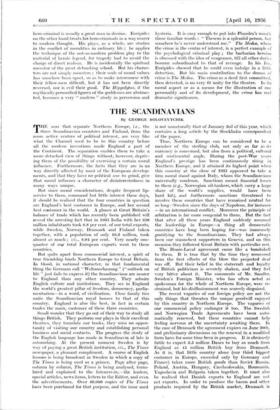CRIME AND THE STAGE
By A. D. WILSON
CRIME is the staple food of modern as of ancient drama. A strange reflection, perhaps. Any genera- tion is of course anxious to find in the theatre an escape from reality, -and crime illustrated at a safe distance is more exciting. than the petty . virtues and vices of mediocrity: The-criminal portrayed by a great dramatist may provoke sympathy and the pious comment "There, hut. for the-grace of God, go I " ; alternatively he may tickle the sense of moral superiority. So much he may do in any age. Purgation by or from pity and fear, whatever that means, may no doubt be accomplished by the gangster play or by the classical tragedy alike.
There are technical rules which are still observed. Avoid the disgusting; said Aristotle ; ne eoram populo natos Medea. trueidet is the Horatian echo ; and today, for all the .staff of nurses that hovers ghoulishly about the exits,. crime's- -consummation is usually achieved in darkness, illumined at most by a pistol flash. It has been.- i-reserved for modern psychologists to discover that...theatre audiences are chiefly intent on self-admira- tion. But they too • have unvarying characteristics ; the more-they- are bored, the more sweets they consume, as the Stagirite himself observed. Cinemas now take- the place of- the circus and are happy hunting-grounds for .rhorige .iWho Practise the art of courtship in Ways described- by Naso. '
But-there can be'no do-ubt that the dramatist's general attitude- towards. crime has changed. The main theme used to be crime and punishment. A crime is often a conveniently significant piece of life, an action with the classically commended beginning, middle and end. It will serve to show concisely that there is an immanent. justice in the world, that the universe is governed by a moral order, or that a guilty conscience is sufficient punishment for-the evil-doer. The best crimes, in Greek eyes, were those which set the moral forces of the world' most swiftly or most surely in action. As long as this result was • achieved, it mattered little whether the original action, the spring of all the elemental activity, was deliberate, and so morally . blameworthy, or not. The moral of the Oedipus Tyrannus is simply that man must not get on the wrong side of the law. Sophocles makes no attempt to prove that the law is a good one. Froth the earliest Aeschylean days, there are, of course, some pretty conflicts of duties, and even of moralities. But such conflicts are treated in rather a legal spirit. The problem of Orestes, for instance, is one for the connoisseur in morals, the distinguished moral arith- metician. The reconciliation of Zeus with the sym- pathetic but none the less criminal Prometheus would probably not have satisfied the comparatively senti- mental moralist of today. The great appeal of the Antigone lies in the fact that her problem is more real than most of the moral issues raised in early Greek tragedy'.
Modern drama also has a technical interest in crime. But its -main theme is "crime and detection" rather than " crime and punishment"- There are of course conflicts of moralities. "When is a crime not a crime?"' Is a. question frequently asked,, and the right to kill, the light and more particularly the right to love, are often opposed to the rules of a more or less established morality. But these oppositions belong more usually to the problem-play than to the crime-play proper. Here the essential moral is different. The apparatus of crime has become so attractive and romantic that the message "Crime doesn't pay" is broadcast to the world as if it were a newly-discovered and profound truth.
Organised society. as the Americans sometimes say, just won't stand for it. "Crime doesn't pay" is the only moral to be drawn from the drama of detection pure and simple. - Apart from the moral question, the emphasis in thc - dramatic treatment of crime has changed completely. Before, the crime would often be given, and the dramatic process would lead to retribution. The case of the man Oedipus is interesting ; the time element alone would make presentation of his .crime difficult, and the Greeks found this omission natural. Sophocles' working out is of great ingenuity, but its effect depends in part at least on the audience's knowledge of the story. The modern' erimino-dramatist has revived the conception of the unities, to make his story neater. Detection must follow ' crime with unnatural speed. There is room for irony if the audience actually knows the author of the crime and could put the detectives on the right track, but quite as often detective and audience alike start in complete ignOr-' ance ; the more surprising to all the clrayi.6/itals, the better. It is interesting to imagine the Oedipus story modernised, with a tactful young private detective from Corinth as its hero. The typical modern criminal play is of a rather awkward form. It consists first of the planning and execution of the crime, then of its detection. It is easiest to formulate this plan musically ; it is like two successive' crescendi, one from mf—ff, the next from p—f. The first is more exciting, the second longer-drawn-out. It is a form much better suited to books, from which it derivec., than to plays. The difficulties of interspersing the 'decide- tive and static business of detection with a certain' amount of action and humorous interlude are considerable.' ' There is usually no tremendous opposition between law' and crime to sustain the interest, though such an opposV' tion supplies whatever moral there is to be drawn. The detective -must therefore be considered as an individual hero, not as a symbolic figure, and it is difficult again to' make him sympathetic or colourful. That is the reason for those plays of doubtful moral effect in which the crime is no crime, and the criminal frankly the cent re of attract ion, or for those more distressing ones, in which the (lull young amateur and a fiancée of abnormal beauty and capacity for feminine intuition do the policeman's job and provide employment for the young actresses who would otherwise be neglected.
The technical treatment of crime has' dramatic disad- vantages when compared with the ethical view of it. But there is another method of portraying crime which has recently come into fashion once more. Criminal psychology is a morbid but interesting study. It will certainly continue to interest the British public while Mr. Emlyn Williams lives to walk the stage. In making a crime play the means for the development of one person- ality, dramatists are returning obviously to Elizabethan and perhaps more truly to late Greek practice. The Elizabethan villain, whose moral values are simply reversed, may sometimes be a subject for the morbid' psychologist—lago is the obvious example—but the hero-criminal is usually a great man in decline. -Euripides on the other hand treats his hero-criminals in a way nearer to modern thought. His plays, as a whole, are studies in the conflict of moralities in ordinary life; he applies the technique of the not-so-modern problem play to the material of heroic legend, for tragedy had to avoid the charge of direct realism. He is incidentally the spiritual ancestor of the great debunking school. But his charac- ters are not simply monsters ; their scale of moral values has somehow been upset, so as to make intercourse with their fellow-men difficult, but it has not been directly reversed, nor is evil their good. The Hippolytus, if the mythically personified figures of the goddesses are abstrac- ted, becomes a very " modern " study in perversion and hysteria. It is easy enough to put into Phaedra's mouth those familiar words : "Theseus is a splendid person, but somehow he's never understood me." The Medea, where the crime is the centre of interest, is a perfect example of the psychological criminal play-; the barbarian heroine is obsessed with the idea of vengeance, till all other duties become subordinated to that of revenge. In his Ion, Euripides showed that he could even indulge in a little detection. But his main contribution to the drama of crime is The Medea. The crime as a deed first committed, then detected, is no very fit unity for the theatre. In its moral aspect or as a means for the illustration of one personality and of its development, the crime has real dramatic significance.











































 Previous page
Previous page